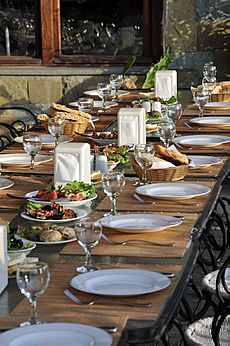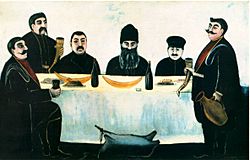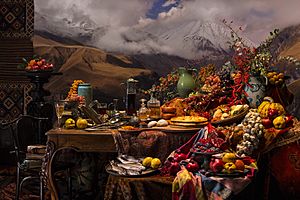Supra (feast) facts for kids

A supra (Georgian: სუფრა) is a special traditional feast from Georgia. It's a big part of Georgian social life and culture. There are two main kinds of supra: a happy, festive supra (called a keipi), and a more serious, sad supra (called a kelekhi). The kelekhi is usually held after a burial.
The traditions of the supra are so important that they were added to Georgia's Intangible Cultural Heritage of Georgia list in 2017. This means they are recognized as a valuable part of the country's living traditions.
What Does "Supra" Mean?
In the Georgian language, the word "supra" literally means "table-cloth." Over many years, it has come to mean a big feast where a large table is set with lots of food.
The word for "table-cloth" might be related to the Persian word sofre. However, in Georgia, "supra" has a much deeper meaning connected to these special meals. You won't find large public meals in Georgia without a supra. Even if there are no tables, the "supra" (table-cloth) can be spread on the ground.
How a Supra Works

Every supra, no matter its size or type, is led by a special person called a tamada. The tamada is like the toastmaster of the feast. They are chosen by the guests or by the host of the supra. A good tamada needs to be a great speaker and be able to lead the toasts well.
During the meal, the tamada will suggest a toast. They will then speak for a while about the topic of the toast. Everyone raises their glasses, but they don't drink yet. After the tamada finishes speaking, the toast continues around the table, usually moving to the right.
The next guest who wants to speak can raise their glass, talk about the toast's theme, and then drink from their glass. If a guest doesn't want to speak, they can still drink after hearing words that they especially liked.
It's okay to eat during the toasts, but talking while someone is speaking is not polite. Once everyone who wants to speak on that topic has finished, the tamada will suggest a new toast. Then the whole process starts again.
Some common toast themes include toasts to God, Georgia, family, the mother of God, different saints, friends, and ancestors. The tamada decides the theme for each toast, making sure it fits the occasion.
A toast at a happy keipi is called a sadghegrdzelo. A toast at a more serious kelekhi is called a shesandobari.


